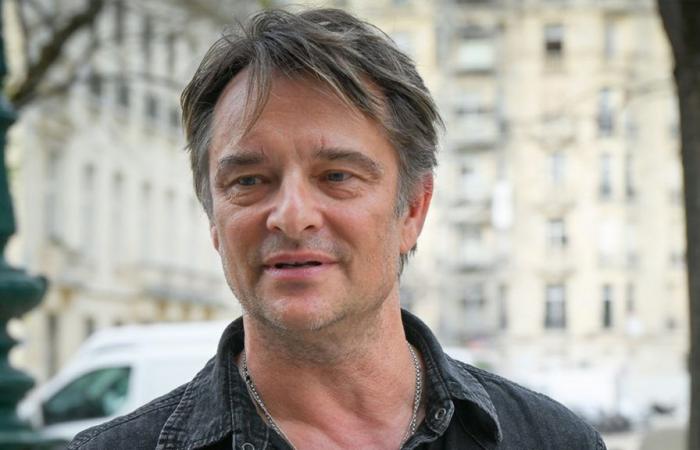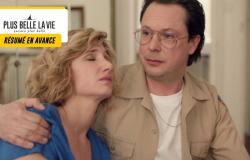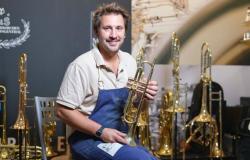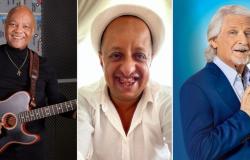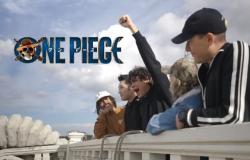David Hallyday talks about the creation of his latest album “Requiem pour un fou”, a passionate tribute to his father and the music that marked his life.
RTL info: In your album “Requiem pour un fou”, you mix your repertoire and that of your father. You cover “L’envie”, “Diego libre dans sa tête”, “Vivre pour le meilleur”. Was it important for you to sing your father’s songs?
David Hallyday : What is important is to tell the rest of the story, of what we started to tell with him. When I composed the album “Sang pour sang”, we started something, and this project went through several trials. Let’s say that it lasted about three years. I started revisiting my songs, and I listened to songs that opened the doors to my career. I found that they had aged a little poorly in terms of production, so I had fun redoing them and revisiting them. Then, I said to myself, why not cover songs that I had composed for my father, like “Sang pour sang”, “A day will come”, “Live for the best”. One thing led to another, I wanted to think a little bigger in my repertoire and go further in his. Finally, I found myself making this album with a family theme.
You mention “Blood for Blood”, a song you composed for him. This time, you sing it as a duet, using your father’s voice. The clip reminds us of the 1999 version. Today, you shot this clip with your son.
It is in fact the normal continuation of things and life. So now we’re three generations of family in one clip. It was very emotional.
Did your son know this song?
He knew the song, but he listens to a bit of everything. I introduced him to pop a bit when he was younger. So he knows this ability to listen to all styles. I gave him his grandfather’s repertoire. He doesn’t know everything, but he doesn’t know everything, but he knows the main ones, that is to say the stage songs like “Que je t’aime”, “Requiem pour un fou”.
Is he also moving towards music?
He loves it, but no, he’s an artist in another way, but not in music. Besides, all my children are artists in cinema and painting.
In 1999, you played billiards with your father, Johnny Hallyday, in the music video. What memories do you have from that time?
I was quite impressed because it was the first video clip we did together on one of my songs. So, there was necessarily something very strong from an emotional point of view. Just the fact of working together on a project was very strong. It was after the recording of the album, so we had already experienced strong things. It was a lot of fun to do, and the fact of being both of us was really nice.
You are now about the same age as he was then. Did that play a role in the choice of songs for your album?
No, I chose certain periods that I found musically prolific in my father’s work. It was the 70s and part of the 80s, with the three albums he had with Michel Berger and the famous album “Gang”. Then there was Jean-Jacques Goldman too, all these songs like “Laura”, “L’environnement”, it’s part of my DNA. I took a bit of those periods, the big stage songs, let’s say.
So there are songs by your father, and yours too, that are modernized, brought up to date. Was that a desire?
Yes, it was a desire. I found it interesting. There were several challenges: can we listen to a song and make a new one, not a cover, but a new song while recognizing it? We call it a cover, but it wasn’t really the case because a cover is a bit like doing the same thing again. I really wanted to present something new. I found it interesting. And for the new generation who don’t necessarily know these songs, I found it interesting to do. But it was a big challenge.
You said it, one of the main themes of this album is filiation. Part of your roots take you back to Belgium. Did you know your grandfather, Léon Smet?
I met him, but in somewhat difficult circumstances. I was very young the first time, I was five or six years old, and then I must have been eight. I met him in an elevator and what struck me was really the eyes of the family.
He rests in a cemetery here in Brussels. You recently took over the management of his grave. Was it natural for you to take that over?
Absolutely, because he was quite an exciting person in that he was also an artist. He did a lot of things. I think he made the first silent film in Belgium. He was an actor, he wrote books, novels. He did a lot of things. So I took part in this artistic side too. It’s true that he ended his life a bit alone, but unfortunately, it was the least he could do to take that up again, it was natural.
Today, you are a grandfather yourself. Your daughter Ilona is the mother of a little Harrison. I hear you are a real grandpa hen?
When my daughter told me she was pregnant, I was obviously very happy, but it hit me a little because I wasn’t ready for it. When we think of grandparents, we have a slightly different image, more advanced in age. My grandfather was much older, so it was different. But ultimately, I found this position absolutely wonderful because we no longer really need to educate, we are only there for the good times and I find that wonderful.
david hallyday
chanteur
Johnny Hallyday

